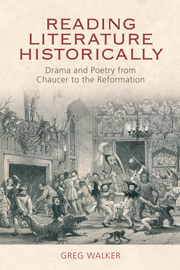Book contents
- Frontmatter
- Contents
- Acknowledgements
- Dedication
- Introduction: Literature and History: The Risks of Conversation
- Part I Drama
- Part II Poetry, 1380–1532
- 4 Courtesy and Chivalry in Sir Gawain and the Green Knight
- 5 The Plowman's Tale and the Politics of 1532: A Cautionary Tale?
- 6 Rough Girls and Squeamish Boys: The Trouble with Absolon in The Miller's Tale
- Index
6 - Rough Girls and Squeamish Boys: The Trouble with Absolon in The Miller's Tale
from Part II - Poetry, 1380–1532
Published online by Cambridge University Press: 05 October 2013
- Frontmatter
- Contents
- Acknowledgements
- Dedication
- Introduction: Literature and History: The Risks of Conversation
- Part I Drama
- Part II Poetry, 1380–1532
- 4 Courtesy and Chivalry in Sir Gawain and the Green Knight
- 5 The Plowman's Tale and the Politics of 1532: A Cautionary Tale?
- 6 Rough Girls and Squeamish Boys: The Trouble with Absolon in The Miller's Tale
- Index
Summary
Absolon, the squeamish parish clerk in Chaucer's Miller's Tale is perhaps a predictable focus for an investigation of the games medieval authors can play with their readers' cultural assumptions and prejudices. He has been the subject of considerable scholarly interest in the past three decades, and a variety of conflicting accounts have been offered of his sexuality, his attitudes towards women, and his literary origins. In part he remains a fruitful source of inspiration precisely because he is so difficult to pin down, both sexually and generically. But, as what follows will suggest, the attempt is worthwhile, both for what it implies about the gendered dynamics of humour in the Miller's Tale, and for its wider implications for attitudes towards male and female identity in the late fourteenth century.
One of the purposes of this chapter is, as its subtitle suggests, to examine just what is troubling for and about Chaucer's squeamish parish clerk. The trouble for Absolon, the apparently disproportionate horror he experiences when he kisses Alisoun's ‘nether ye’ (or perhaps, more accurately, when he reflects on the implications of that kiss immediately afterwards) is one part of the problem; and takes us into the world of psychoanalysis and gender theory. But we need to ponder also the trouble with Absolon, why it is that he troubles us; why he continues to provoke interest and discussion among scholars and readers of the Tale.
- Type
- Chapter
- Information
- Reading Literature HistoricallyDrama and Poetry from Chaucer to the Reformation, pp. 169 - 198Publisher: Edinburgh University PressPrint publication year: 2013



